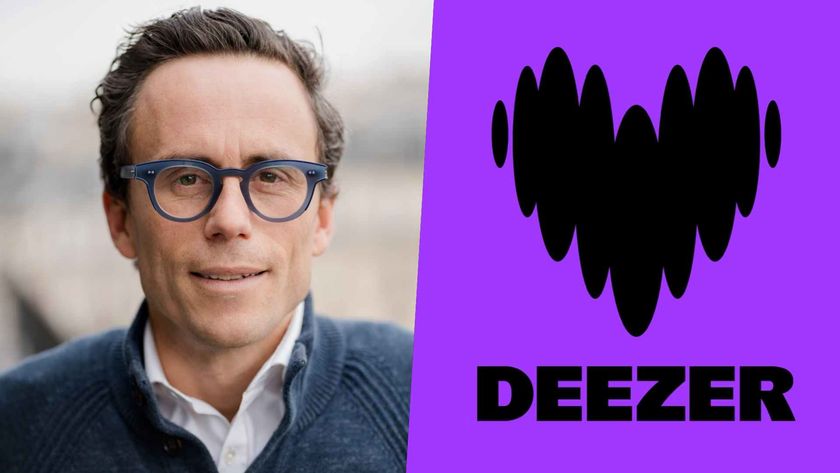
Striking Matches talk working with T Bone Burnett on their debut album
It's only February, but already one of the year's best releases has arrived in the form of Nothing But The Silence, the full-length debut by Striking Matches, the Nashville-based duo composed of Sarah Zimmermann and Justin Davis who, despite their youth, manage to get just about everything right.
From their high-energy, bravura guitar picking to their seamlessly blended vocals to their crop of irresistible songs that survey the mysteries of feelings and human relationships, Zimmermann and Davis are a complete package, artfully mixing country, blues and rock into a winning stylistic whole. Zimmermann and Davis sat down with MusicRadar recently to talk about how they went from a chance meeting in college to seeing their songs featured in the hit show Nashville to working with esteemed producer T Bone Burnett on their first LP.
OK, so how does a brand-new duo get T Bone Burnett to produce them?
Justin Davis: [Laughs] “Well, there's a little story to it. T Bone has always been great friends with our manager at the time, John Grady. Grady had been sending T Bone our songs, sort of bouncing them off him opinion-wise. There was nothing too serious about it, but we always thought it was cool, especially when T Bone would e-mail back – ‘Hey, that’s a great song. That new one is really cool.’ This went on for years.
“I think our connection to the Nashville show, with T Bone producing the music for the first season, sort of furthered our relationship. He produced a couple of our songs for the show when they got picked up. After he left, and after we’d gotten our record deal, he knew enough about us and our music, and so he became the first in line. When he said, ‘Guys, I would love to make a record with you,’ we were like, ‘Of course!’ [Laughs] We didn't have to think twice about that one.”
I would imagine that plenty of people wanted their songs in the show Nashville – and you two managed to place eight of your tunes throughout various episodes. What's the story there?
Sarah Zimmermann: “That actually happened through our publisher – we write for Universal Publishing. The music supervisors were in Nashville a few months before the pilot even aired, and they were listening music for a week straight. One of the pluggers at Universal called up the supervisors when they were about to go to the airport.
“He offered to take them to lunch and drive them to the airport if they would just give us a listen. We played three songs for them live – one of them was When The Right One Comes Along, which got on the show. They loved it and thought it would be perfect. They even had a scene written around the song – pretty amazing. After that, they became real fans of our music. We would be just writing to write, but they kept asking for more songs.”
What surprised you most about working in the studio with T Bone?
Zimmermann: “The way he works in the studio is, he’ll take a song that you’re about to record and then he’ll play you something that’s really abstract and totally different. It kind of keeps you on your toes."
Davis: “At first, you’re like, ‘OK, where’s he going with this?’ But then you find out that there’s a reason why he wants you to hear that other thing. He can be very hands-off as a producer; he just sort of gingerly steps in at certain moments, and he does it so slightly that you don’t even feel like you’re being produced. He tends to observe and be a presence.”

On producer T Bone Burnett
Zimmermann: “It’s interesting when he’ll play something obscure up against what you’re about to record. Sometimes the two things are so different that you can’t even see a connection. T Bone wants you to hear and feel something, and sometimes it’s subtle. Once, when we were getting ready to record When The Right One Comes Along, he took us in the control room and played us Sinatra’s In The Wee Small Hours Of The Morning, which is this super-gorgeous, simple melody. ‘Do that! Pretend you’re Frank,’ he said. I went out to the other room and took my vocal out of my headphones so all I could hear was Justin’s guitar. We did the song and T Bone said, ‘That’s it. We’re done.’
“I didn’t even know we were rolling – I thought we were just rehearsing it – but that was the take we ended up using for the record. Something about what T Bone had played for us, the Frank track, it must’ve made an impression, even subconsciously. He has ideas and hunches. He knows what will work, and he'll take you on a little journey to get the result.”
Davis: “T Bone would also walk around the studio burning this stuff called Palo Santo. It’s like this incense-y wood stuff – the whole studio would smell of it. But it actually does have a calming effect on you.”
So T Bone was “hands-off,” as you say. Did he help shape the songs in any way, or did he more or less leave them alone?
Zimmermann: “We had the arrangements pretty much set in place before we even went in to make the record. There’s a couple that are new, but most of the songs we’d been playing live for so long. We knew what we wanted to do with them and where we wanted them to go.
“Except for Never Gonna Love Again – that one went through some big changes. We’d made a demo of it, so I had the rhythm and the feel of it in my head. T Bone wanted to take it somewhere else; the word he used was ‘tribal.’ I just remember sitting in the studio during the middle of tracking, shaking my head and thinking, ‘This is so wrong. I hate this.’ [Laughs] But when we got up and went in the control room and listened to it, it was a different story. I loved it! From the time it took to go from the main room to the control room, I completely changed my tune.”
Davis: “There are so many great reasons why you want a guy like T Bone involved. I think mainly it’s because you have so much respect for him and you trust him. If he makes a suggestion, you just know that it’s gonna be worth doing. Even something like Never Gonna Love Again, where the song really changed and it was a little scary at first, when you hear where he wanted to go with it and that it all made sense, it felt really good.”

Meshing guitar styles
How long have you been together?
Zimmermann: “We’ve been a band for about five years. We’ve known each other for seven.”
Nashville is probably the hottest music town in the world right now. Was it hard to get noticed?
Zimmermann: “We actually both moved to Nashville to be guitar players, so we didn’t have the original intention to do the artist thing. We got thrown together in school, at Belmont University, when we were guitar majors. They had this sort of hazing thing where they have the freshman get up in front of the seniors and play in pairs. They paired me up with Justin.”
Davis: “It was a scary thing, as you can imagine. Sarah was the only girl in the class. I was hanging out with a bunch of guys, and we saw her and sort of said, ‘OK, as long as we don’t get the girl we should probably be all right.’ It was silly, but I’d never seen a girl guitar player in my life, with the exception of Bonnie Raitt.
“Sure enough, they called me and Sarah up, and I thought, ‘Great. I’m gonna embarrass myself on my first day of school.’ I looked at her and asked her if she knew some blues. She whipped out her slide and proceeded to put everybody’s jaws on the floor – including mine.” [Laughs]
After that experience, how did you two go about meshing guitar styles?
Zimmermann: “Honestly, it was the most natural thing in the world. We’ve fine-tuned it over the years, but right away we were totally compatible. We’ve played with a lot of players and written with a lot of people – sometimes it just doesn’t work very well.
Davis: “Sarah and I seem to fit together like puzzle pieces. She pushes me and I push her. She comes from the bluesy, milk-every-note school, and I’m more from the fast, technical side of things. I think if we played in similar ways, if our influences were the same, it wouldn’t work so well or be as interesting.”
Zimmermann: “To me, blending guitar styles is just like putting singing voices together. You don’t want two voices doing the same thing – then you might as well have one voice.”
And your singing voices blend beautiful as well. Did you study other vocal duos? There’s a little bit of an early Buckingham-Nicks thing going on with you guys.
Davis: “That’s funny you mention them, because absolutely we looked to them. We're huge Buckingham-Nicks fans. Me being a fingerstyle guitarist, I’ve always looked up to Lindsey Buckingham. Him, Chet Atkins, Mark Knopfler, Jerry Reed. Those guys are amazing.”

Brisk picking on Trouble Is As Trouble Does
There are some really cool acoustic fingerstyle licks on Trouble Is As Trouble Does.
Zimmermann: “That was a funny one. I remember sitting down in my room with my acoustic guitar. I had written that line, ‘Trouble Is As Trouble Does,’ and all at once I just started playing that riff. I don’t know where it came from, but I had a capo on the third fret, and there it was. I played it for Justin – ‘Check this out’ – and he loved it. It became the song that starts our shows, and it kicks off the record.”
Davis: “It’s become a nice introduction to who we are. It’s us both going at it on this one lick; we start playing it in unison and then I go up an octave. We’ve tried to see how fast we can play it – sometimes it gets pretty crazy.” [Laughs]
Songs like Make A Liar Out Of Me and Never Gonna Love Again feature some terrific electric blues playing.
Davis: “Sarah is shy about me talking up her solo on Make A Liar Out Of Me, but I think it’s one of the more fun moments on the record. She went in to record it, and she nailed it in one take. We finished it and everybody started laughing. She just killed it.”
What kinds of guitars do you use? I’ve seen videos in which you’re both playing Takamine acoustics.
Zimmermann: “Yeah, Takamine’s are great. We’ve gotten to be really great friends with those guys, and they’ve come to be incredible supporters of ours. We love those guitars; we’ve taken them on the road, and they’re such workhorses. Well, Justin has broken his a few times, but it’s still kickin’.” [Laughs]
Electric-wise, what are you using?
Davis: “Sarah had always played this really cool Tele, and I’d always used a Strat. That combination worked out pretty well. One of the coolest, most helpful suggestions T Bone made was when he looked at Sarah and said, ‘You know what you need? A white SG.’ I don’t know who he was thinking of, but I remember Sister Rosetta Tharpe played a white SG.
“We said, ‘Yeah, that would be cool.’ It made total sense electronically and musically, because the Strat has the single-coil sound, and the SG would offer that bigness and warmth with those humbuckers. Once we tried the SG, we thought it really complemented the whole picture – not to mention that it just looks super-cool.” [Laughs]
Did T Bone bring out any special amps? I would imagine he’s got quite a collection.
Davis: “There were a few. Most of them were so old and dusty. We were so busy working that we didn’t notice what they were, really. We plugged into all kinds of things and got some wacky sounds.”
Zimmermann: “I plugged a mandolin into my amp. It was great getting that distortion with a bluegrass vibe. That’s what was so great about T Bone – he was into trying anything. Whatever got the right sound, he was game. Even when something sounded a little ‘off,’ if it had the right spirit, he was gung-ho.”
Striking Matches' Nothing But The Silence will be released on March 24 on I.R.S. Nashville. You can pre-order the album at iTunes.

Joe is a freelance journalist who has, over the past few decades, interviewed hundreds of guitarists for Guitar World, Guitar Player, MusicRadar and Classic Rock. He is also a former editor of Guitar World, contributing writer for Guitar Aficionado and VP of A&R for Island Records. He’s an enthusiastic guitarist, but he’s nowhere near the likes of the people he interviews. Surprisingly, his skills are more suited to the drums. If you need a drummer for your Beatles tribute band, look him up.

"Reggae is more freeform than the blues. But more important, reggae is for everyone": Bob Marley and the Wailers' Catch a Fire, track-by-track

“Part of a beautiful American tradition”: A music theory expert explains the country roots of Beyoncé’s Texas Hold ‘Em, and why it also owes a debt to the blues

"Reggae is more freeform than the blues. But more important, reggae is for everyone": Bob Marley and the Wailers' Catch a Fire, track-by-track

“Part of a beautiful American tradition”: A music theory expert explains the country roots of Beyoncé’s Texas Hold ‘Em, and why it also owes a debt to the blues
Most Popular








